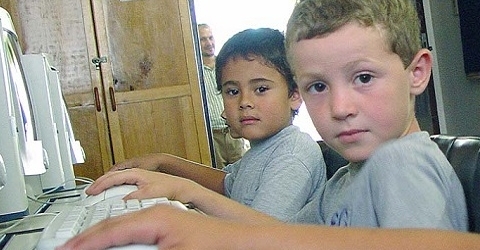How much screen time for children is too much?

While the internet age and mobile connectivity have been hugely positive developments overall, they’ve come at a price.
From trolling to phishing, from FOMO to a decline in social conversation, lives lived online demand compromises in exchange for access to digital entertainment and communications.
And a growing body of research suggests our obsession with introducing small children to the digital world is having a very real effect on their health and wellbeing.
Little and (not very) often
At this point, some parents may be scowling and thinking “I know how much time my kids should spend online”.
And if the answer is “none at all”, then they have correctly identified the recommended amount of screen time for children under the age of two.
That’s according to the World Health Organization, who have spent years researching the optimal balance between sleep, screen time and socialising for pre-school children.
Startlingly, the WHO figures regarding screen time for children hardly change as babies become toddlers.
A two year old should spend a maximum of 60 minutes in front of a screen throughout each 24-hour period.
By comparison, they should spend at least three hours engaged in physical exercise, and between 11 and 14 hours asleep.
In fact, recommended screen time figures are identical for two, three and four-year olds.
”But mobile devices are educational!”
That’s a commonly-held opinion, especially among parents seeking half an hour’s peace to cook, clean and relax while baby plays on an iPad.
And while the WHO doesn’t dispute some apps and programmes may offer educational merit, they believe many kids are being massively over-exposed to them.
Of course, similar sentiments have been expressed about television since the 1970s.
But whereas studies into the links between child development and TV viewing are well-established and numerous, the same can’t be said of smartphone and tablet use.
These platforms are too new to have had a generation of youngsters grow up using them, so definitive conclusions are hard to draw.
However, the WHO has spent years identifying optimal screen time limits, irrespective of a child’s gender, ability, class or cultural background.
They employed 16 academics and healthcare professionals with expertise in child development to produce a landmark report, which was released earlier this year.
It incorporated the latest guidelines published by governments from Canada to New Zealand, regarding the use of electronic entertainment and leisure devices.
The report also drew on analysis by national health services and clinical experts, including almost 100 medical studies and 330 peer-reviewed papers.
Reducing or eliminating screen time was noted to have consistently positive effects on BMI, motor functions, cognitive development, psychosocial health and interpersonal skills.
The WHO believe the educational merit of apps and online games are heavily outweighed by real-world play, interaction and learning.
The benefits of minimising screen time for children time could extend throughout their lives – even if those lives involve regular internet use as teenagers and adults…






